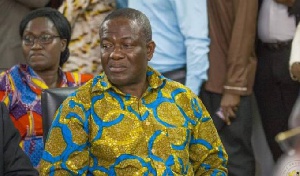In an effort to unite the people of Dagbon to smoke the peace pipe in accelerating development, the “Dagbon Peace and Progress Now” project has been launched in Tamale in the Northern Regional capital.
The initiative aimed at rekindling efforts to achieve peace in Dagbon and to attract investors to unleash the huge potentials to create jobs and development in Dagbon.
The initiative organised by the Northern Regional Coordinating Council and the Dagbon Malimizungo (DAMAZ) network forms part of government’s agenda to permanently resolve the Dagbon chieftaincy dispute between the Abudu and Andani Royals.
Dagbon is said to among the least communities lacking behind progress due to high chieftaincy dispute thereby driving away investors and also preventing governments from extending economic activities to the areas.
Speaking at the event in Tamale, Alhaji Abdul Razak Saani, the Northern Regional Director of the National Commission for Civic Education (NCCE) called on politicians to desist from meandering into chieftaincy issues by rather helping to escalate them for their selfish gains.
“Politics will not solve the Dagbon issue but rather we need to be as sincere as we can so that together we can work to ensure that the road map is achieved “he stated.
He called on all religious leaders intervene to liaise with the traditional leaders and the peace council to address their chieftaincy issues instead of resorting to politicians.
He called on all to tolerate one another and respect the laws of the country for democracy to flourish.
The Chieftaincy and Religious Affairs Minister, Mr Samuel Kofi Dzamesi reiterated government commitment to try to give the people of Dagbon the needed peace saying government will not interfere with chieftaincy issues in the country but rather ensure peace to bring about development.
“Nobody should allow any politician or individual for their selfish gains which ends up jeopardizing the future of the younger generation to influence them” he said.
He said the Ministry would also support the codification of chieftaincy successions at the various traditional areas and assured that government would not interfere in enstoolment and enskinment of chiefs.
Mr Salifu Sa-eed, Northern Regional Minister, stressed the need for all to come together irrespective of tribe or political background to sustain the project to enhance development in the region that will alleviate poverty.
According to him, the ability to resolve the long chieftaincy issues will attract more investors since the region is the gate way to other Sahelian countries.
He stated categorically that “the project is non-partisan and therefore included all citizens, political and religious leaders among others to deliberate on issues affecting the region in retarding economic growth”.
He appreciated previous governments attempt to solve the Dagbon chieftaincy feud and emphasized the need for multifaceted approach to finally achieve the desired peace needed in Dagbon.
He assured traditional authorities in Dagbon that government will give them foreign travel opportunities to woo investors to their traditional areas.
The former Northern Regional Minister, Alhaji Mohammed Muniru Limuna called on government to use the right channel in resolving the Dagbon chieftaincy feud.
According to him, any attempt to digress from the already laid down roadmap to peace could mar earlier progress made towards building a united Dagbon.
The representative of the Northern regional Peace council Mr Patrick Apullah stressed the need for peaceful environment in every community of the region to boost productivity.
According to him, peace is the route to national level and if the routes are crooked, it can never yield any fruit for sustainability.
Mr Apullah noted that the Northern Ghana is the basket mouth of the country and other neighbouring countries and therefore the need to allow peace to exist to bring about development.
General News of Wednesday, 13 September 2017
Source: thebftonline.com

















